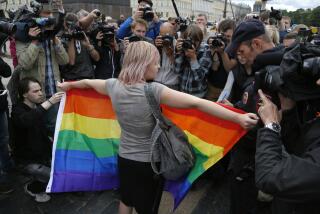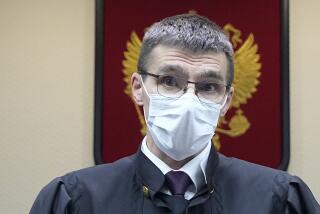Religion on Trial in Russian Court
- Share via
MOSCOW — Prosecutors launched a drive Tuesday to outlaw the Jehovah’s Witnesses, accusing them of fomenting religious strife at the start of a trial that could have sweeping implications for all faiths in Russia.
The case is the most prominent test so far of Russia’s new law on religion, which is designed to curb the activities of foreign religious organizations seeking new members in Russia.
Prosecutors brought charges under an article seeking to outlaw dangerous cults. The indictment accuses the Jehovah’s Witnesses of inciting religious discord, splitting families, promoting suicide and denying medical care to the critically ill.
Human rights advocates warn that although the Russian Constitution officially protects freedom of worship, a ruling against the Witnesses could be used to outlaw any religious group that falls out of favor with authorities.
“This is a major test case,” said Diederik Lohman, director of the Moscow office of Human Rights Watch. “If they win this case, they can easily use it as a precedent to close down groups throughout Russia.”
The ruling in the trial, held in a small, stuffy local district courtroom in northern Moscow, will technically apply only to that district of the capital. But both sides say its impact will be felt throughout Russia.
“The central issue is whether the government can classify any religious group they want to close down as a cult,” said Lawrence Uzzell, Moscow director of the Oxford-based Keston Institute, which monitors religious freedoms in former communist countries.
The central accusation against the Witnesses is that they “foment religious strife” by claiming to be “the only true religion.” That’s an assertion made by nearly every faith, Uzzell noted.
“Any religion that claims to be in possession of a divine revelation--as all major world religions do--could be outlawed if they should fall out of favor with the authorities,” he said.
Prosecutors hope to call dozens of family members of Jehovah’s Witnesses to testify about the group’s practices. “We believe they are violating Russia’s civil laws,” said the lead prosecutor, Natalya Adamova. “When you propagandize against other religions, you should stay within certain boundaries and not insult the other faiths. We think that’s what they are doing.”
Prosecutors cite literature that refers to people outside the Jehovah’s Witnesses as “adherents to the world of Satan.” They also cite the Witnesses’ prohibition against blood transfusions as evidence for the charges of promoting suicide and denying medical care.
Critics note that the charges are based on general assertions of the group’s beliefs and practices, not specific cases of alleged wrongdoing.
“What they are trying to do is close them down purely on the basis of what they write and what they say,” Uzzell said. “That’s discriminatory. It’s treating some religious ideas more favorably than other ideas.”
Russia’s new religion law has its roots in Soviet-era repression of all faiths. Certain groups, including the Russian Orthodox Church, were able to worship in a restricted manner, but they were forced to register with the authorities and could not actively recruit adherents, even members’ own children.
After the collapse of the Soviet Union, interest in religion surged and many people flocked to the Russian Orthodox Church. Religious organizations ranging from the Roman Catholic Church to the Japan-based Aum Supreme Truth cult also became active, attracting hundreds of thousands of converts.
The religion law, promoted by the Russian Orthodox Church and signed by President Boris N. Yeltsin in September 1997, recognizes only four faiths as “traditional” in Russia: Orthodoxy, Islam, Judaism and Buddhism.
The law requires groups perceived to be “foreign” to demonstrate a continuous 15-year presence in Russia before they are permitted to worship publicly.
Jehovah’s Witnesses, unlike many such groups, were active in Russia before the Bolshevik Revolution. Several thousand members were exiled to Siberia during Stalin’s Great Terror purges of the 1930s. They have been expanding rapidly in recent years and claim 100,000 committed members.
John Burns, a Canadian lawyer who is a member of the Witnesses’ legal team, suggests that Russians are uncomfortable with the competition of religious ideas.
“They are afraid of diversity,” he said, gesturing to the opposite side of the courtroom.
Prosecutors insist that they have nothing against freedom of religion. They say they are acting on behalf of family members who believe that their loved ones have been sucked into an all-controlling society.
“This group is very aggressive,” complained Yelena Ivanovna, a member of the Committee to Save Our Youth, an anti-cult organization that promoted the case. She gave only her first and middle names, according to Russian tradition.
“Our young people are very gullible. They want to live a spiritual life and they get involved with this group. Then, three months later, all the demands begin, that they have to give a certain number of hours a week. They don’t work, don’t study, don’t spend time with their families.
“We are all for freedom of religion, but we are not for these enormous pressure tactics,” she said.
More to Read
Sign up for Essential California
The most important California stories and recommendations in your inbox every morning.
You may occasionally receive promotional content from the Los Angeles Times.










